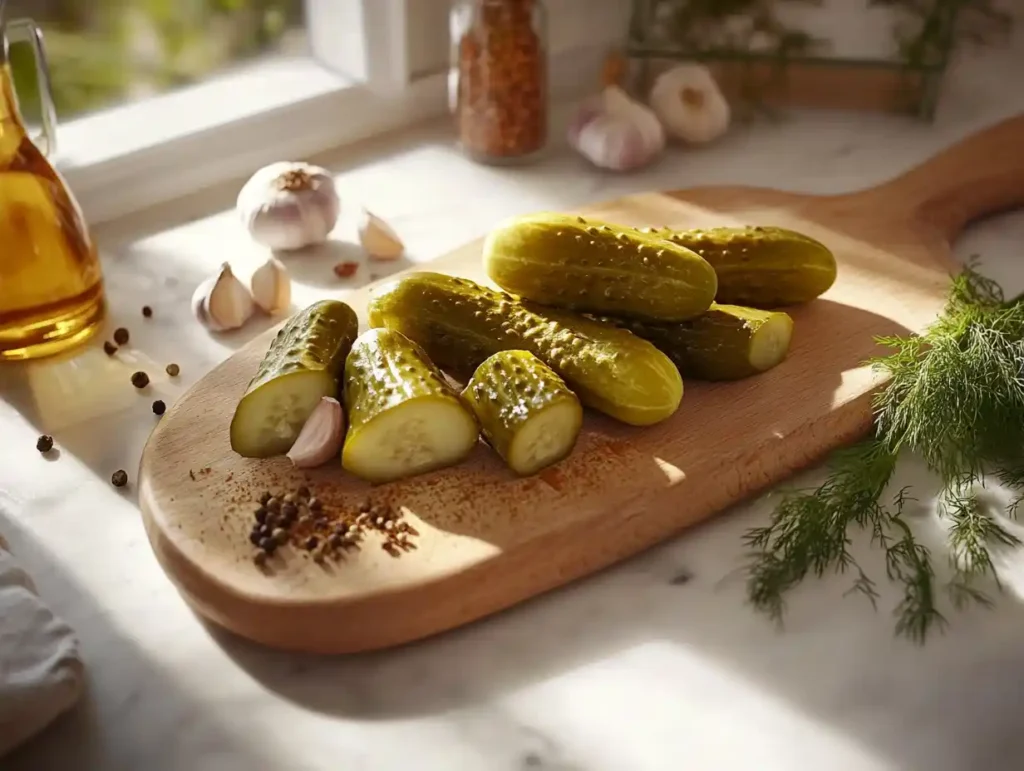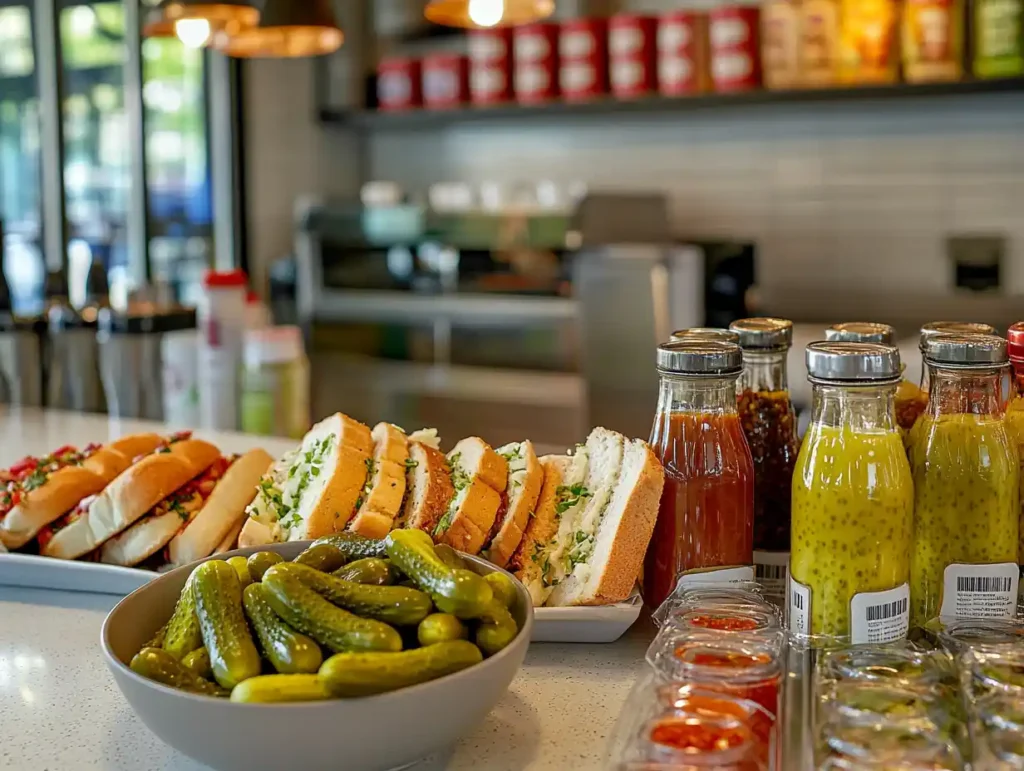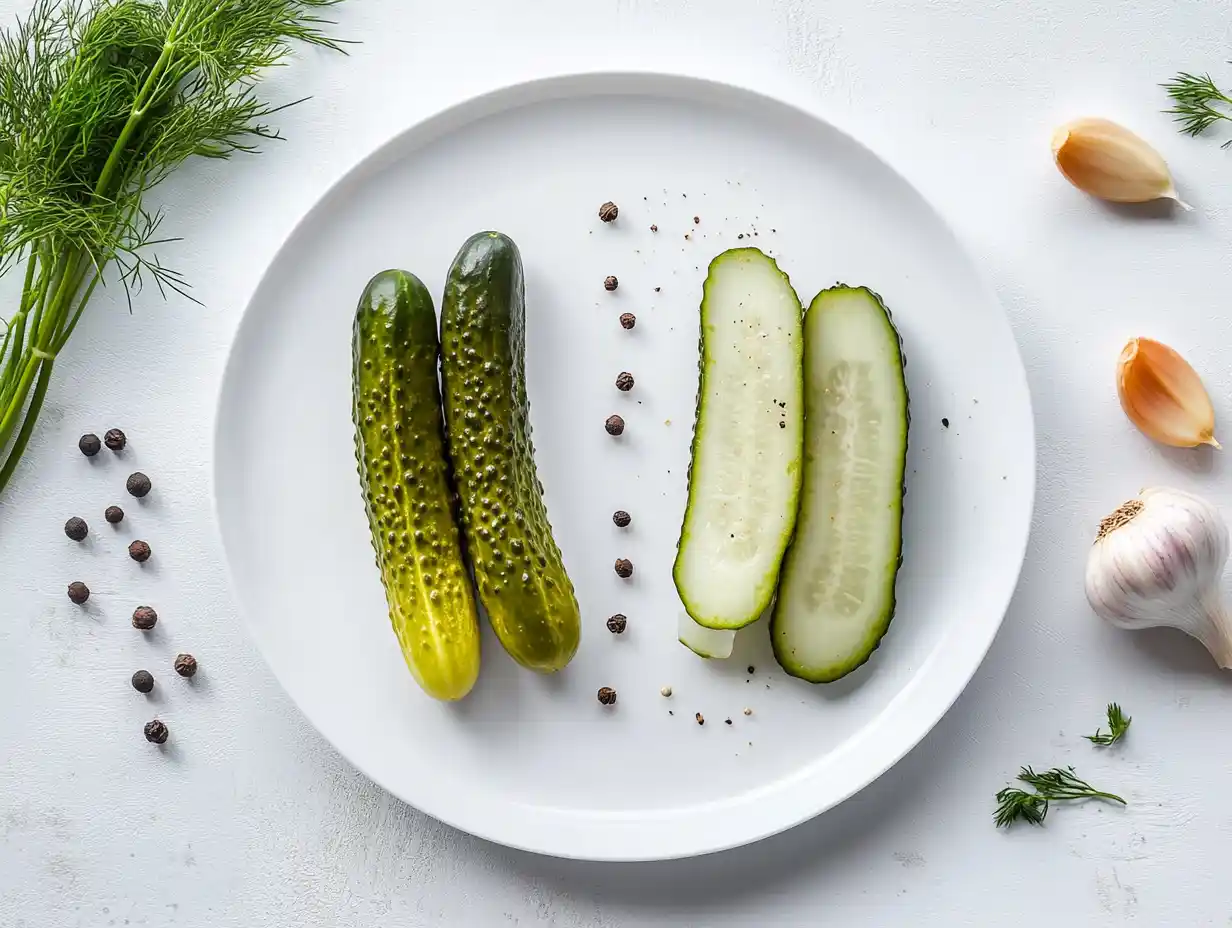Introduction
Pickles are a beloved snack and condiment, but have you ever wondered what sets a kosher dill pickle apart from a regular dill pickle? While both are deliciously tangy and packed with flavor, their differences lie in ingredients, preparation methods, and cultural origins.
This article dives into the details of dill pickles and kosher dill pickles, explaining their unique characteristics and why they hold a special place in culinary traditions. Whether you’re a pickle enthusiast or just curious, this guide will help you appreciate these iconic treats even more.
What is a Dill Pickle?
Dill pickles are a classic type of pickle, loved for their tangy flavor and versatility. They are made by preserving cucumbers in a brine flavored with dill, which gives them their distinct taste. Dill pickles are a staple in many cuisines, often used as snacks, toppings, or sides.
Ingredients of Dill Pickles
The key ingredients for dill pickles are cucumbers, dill, vinegar, water, and salt. These form the base of the brine, which preserves the cucumbers and infuses them with flavor. Some recipes include garlic, mustard seeds, or peppercorns for an added kick.
Flavor Profile of Dill Pickles
Dill pickles are tangy, savory, and slightly salty. The vinegar brine gives them a sharp taste, while the dill herb adds freshness. The combination makes them a perfect companion for rich dishes like burgers, sandwiches, or fried foods.
Types of Dill Pickles
There are several types of dill pickles, each offering a unique twist:
- Regular Dill Pickles: These are fully pickled in a vinegar brine for a tangy and crisp result.
- Half-Sour Dill Pickles: These are lightly pickled, offering a milder flavor and crunchier texture.
- Spicy Dill Pickles: These include chili flakes or hot peppers, giving them a spicy kick.
What is a Kosher Dill Pickle?

Kosher dill pickles are a specific type of dill pickle with roots in Jewish culinary traditions. While the term “kosher” refers to Jewish dietary laws, in this context, it often signifies a style of pickling rather than strict adherence to kosher guidelines.
Defining “Kosher” in Food Terms
In general, “kosher” means food prepared according to Jewish dietary laws. However, with kosher dill pickles, the term primarily describes the traditional preparation methods used in Jewish communities. These pickles are typically associated with the tangy and garlicky flavors popularized by Jewish delis.
Ingredients of Kosher Dill Pickles
Kosher dill pickles share many ingredients with regular dill pickles, such as cucumbers, dill, vinegar, water, and salt. However, garlic is a defining addition, giving kosher dill pickles their bold, savory flavor. Some recipes also include peppercorns or chili flakes for extra complexity.
The Role of Jewish Culinary Traditions
Jewish immigrants brought the tradition of kosher dill pickles to the United States, where they became a staple in delis. These pickles were originally fermented in barrels, a process that intensified their tangy and garlicky flavor. Over time, kosher dill pickles gained popularity far beyond their cultural origins.
Health Benefits of Dill and Kosher Dill Pickles
Dill and kosher dill pickles are more than just tasty snacks—they also offer several potential health benefits. Depending on the preparation method, these pickles can contribute to gut health, hydration, and more.
Rich in Probiotics (Fermented Pickles)
Some kosher dill pickles, especially those made using traditional fermentation methods, are rich in probiotics. Probiotics are beneficial bacteria that support gut health, improve digestion, and strengthen the immune system. Look for pickles labeled “naturally fermented” for these benefits.
Low in Calories, High in Flavor
Pickles are a great low-calorie snack, providing bold flavor without excess fat or calories. This makes them ideal for weight management or healthy snacking, as they satisfy cravings for something tangy and savory.
Source of Antioxidants
Dill, a key ingredient in both dill and kosher dill pickles, contains antioxidants. These compounds help combat free radicals in the body, promoting overall health and potentially reducing inflammation.
Hydration and Electrolytes
Pickles are made with a salty brine, which can help replenish electrolytes lost during exercise or heat. This makes them a popular choice for athletes or anyone needing a quick hydration boost.
Watch Out for Sodium Content
While pickles have health benefits, they are often high in sodium. Eating them in moderation is key to avoiding excessive salt intake, which can affect blood pressure and overall health.
Key Differences Between Kosher Dill Pickles and Regular Dill Pickles
Kosher dill pickles and regular dill pickles share many similarities, but they have distinct differences in flavor, preparation, and cultural significance. These variations make each type unique and appealing in its own way.
Use of Garlic in Kosher Dill Pickles
Garlic is a defining ingredient in kosher dill pickles. It gives them a bold, savory taste that sets them apart from regular dill pickles, which may not always include garlic. This garlicky flavor is a signature characteristic of kosher dill pickles, especially those inspired by traditional Jewish recipes.
Traditional Kosher Preparation
Traditional kosher dill pickles are often fermented using natural brining methods. This process relies on saltwater instead of vinegar, allowing natural bacteria to create a tangy flavor. Regular dill pickles, however, are typically made with vinegar, which produces a sharper taste and quicker pickling process.
The Term “Kosher” as a Label
The word “kosher” in kosher dill pickles does not always mean the pickles are certified kosher by religious standards. Instead, it often refers to the pickling style popularized by Jewish delis. For actual kosher certification, the pickles must meet specific dietary laws and be overseen by a rabbi during preparation.
Flavor Intensity
Kosher dill pickles tend to have a more intense flavor profile due to the garlic and traditional brining process. Regular dill pickles are typically milder, making them versatile for use in a variety of dishes or snacks.
How Kosher Dill Pickles Became Popular

Kosher dill pickles have a rich history that reflects the cultural journeys of Jewish immigrants. Their rise in popularity is deeply tied to Jewish delis, urban food culture, and their unique flavor.
Jewish Immigration to the US
Jewish immigrants from Eastern Europe brought traditional pickling techniques to the United States in the late 19th and early 20th centuries. They introduced fermented pickles made in saltwater brine, which quickly became a staple in their communities. These pickles were not only delicious but also practical, as pickling preserved cucumbers for extended periods.
The Rise of Delicatessens
Jewish delis played a crucial role in popularizing kosher dill pickles. These delis served the pickles as side dishes with sandwiches, soups, and other hearty meals. The bold, garlicky flavor of kosher dill pickles paired perfectly with classic deli staples like pastrami on rye or corned beef.
Delis became cultural hubs, attracting customers from diverse backgrounds who fell in love with kosher dill pickles. Over time, their reputation spread beyond Jewish communities, making them a widely recognized and loved snack.
Kosher Dill Pickles in Modern Cuisine
Today, kosher dill pickles are a staple in both traditional and modern cuisines. They are used in burgers, sandwiches, and salads, and are enjoyed as standalone snacks. Their bold flavor and satisfying crunch have also made them popular in recipes like fried pickles and pickle-flavored dips.
Kosher dill pickles continue to appeal to new generations of food lovers, cementing their place as a classic yet versatile treat.
FAQs About Kosher Dill Pickles
Kosher dill pickles are a beloved snack, but they also spark curiosity. Here are answers to some of the most common questions.
Are kosher dill pickles healthier than regular dill pickles?
Both types are similar in nutrition, offering low calories and bold flavors. However, traditionally fermented kosher dill pickles may have probiotics that support gut health. Regular dill pickles made with vinegar lack these beneficial bacteria.
Does kosher mean the pickles are blessed by a rabbi?
No, the term “kosher” in kosher dill pickles usually refers to the pickling style. Unless the product is certified kosher, it doesn’t meet religious dietary laws or involve rabbinical supervision.
Can you make kosher dill pickles at home?
Yes, you can easily make kosher dill pickles at home. Combine cucumbers, garlic, dill, salt, and water for fermentation. Let them sit for several days to develop their signature tangy flavor.
Why are kosher dill pickles so garlicky?
Garlic is a key ingredient in kosher dill pickles, giving them their bold and savory taste. This tradition comes from Jewish pickling methods that emphasize robust flavors.
Are all kosher dill pickles actually kosher?
Not necessarily. Many kosher dill pickles use the term “kosher” to describe the style rather than meeting actual kosher certification. Check labels if you need certified kosher products.
Conclusion
Kosher dill pickles and regular dill pickles may seem similar, but their differences make each type unique. Kosher dill pickles stand out with their bold, garlicky flavor and roots in Jewish culinary traditions. Regular dill pickles, on the other hand, offer versatility and milder taste, making them a favorite in many dishes.
The cultural history of kosher dill pickles, from their origins with Jewish immigrants to their rise in delis and modern kitchens, highlights their enduring appeal. They represent a blend of tradition and innovation, bringing bold flavors to sandwiches, burgers, or even as stand-alone snacks.
Whether you enjoy the tangy crunch of a kosher dill pickle or the subtle flavor of a regular dill, both types deserve a spot in your pantry. They showcase the versatility of pickling and the joy of discovering cultural and culinary differences through food.
For more pickle-related insights, explore what makes Claussen pickles different for a unique perspective. You might also enjoy our guide on the secret to crisp dill pickles for achieving the perfect crunch. Finally, check out are Claussen pickles fermented or vinegar-based to learn about their distinct preparation methods!

